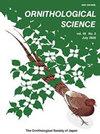北太平洋西部黑背信天翁和黑足信天翁物种、性别和繁殖期的稳定同位素差异
IF 0.3
4区 生物学
Q4 ORNITHOLOGY
引用次数: 0
摘要
摘要为了解北太平洋西部海域黑脚信天翁(Black-footed Albatross P. nigripes)和黑脚信天翁(lesan Albatross phoebastia immutabilis)的食性,研究了不同种类、性别和繁殖期的同位素差异。我们测量了信天翁(在日本远洋延绳钓中捕获)的肌肉和肝脏及其潜在猎物的碳和氮同位素比率。黑脚信天翁的δ 13C和δ 15n均高于黑头信天翁。两种鸟δ ta13c值存在季节差异,孵化期δ13C值低于供雏期和非繁殖期δ13C值。雄性和雌性的δ 13C和δ 15n水平无显著差异。结果表明,黑脚信天翁以高同位素的猎物为食,而黑头信天翁则以除鱿鱼和鱼类以外的低同位素猎物为食,δ13C随猎物可利用性的季节变化而变化。这意味着黑脚信天翁比黑头信天翁更多地以渔业的废料为食;这又可能与北太平洋西部延绳钓渔业的作业海域有关。综上所述,监测信天翁的饮食和觅食区域,确定信天翁最可能被副捕的高风险区域,对这两种信天翁的保护具有重要意义。本文章由计算机程序翻译,如有差异,请以英文原文为准。
Stable Isotope Differences among Species, Sexes, and Breeding Stages of Laysan and Black-Footed Albatrosses in the Western North Pacific
Abstract In order to understand the diet of Laysan Albatross Phoebastria immutabilis and Black-footed Albatross P. nigripes in western North Pacific waters, we investigated isotopic differences between species, sexes and breeding stages. We measured carbon and nitrogen isotope ratios in the muscles and livers of albatrosses (caught during Japanese pelagic longline fishing) and in their potential prey. Both δ 13C and δ15N of Black-footed Albatross were higher than those of Laysan Albatross. Delta13C of both species differed seasonally and δ13C was lower during the incubation period than during the chick-provisioning and non-breeding periods. The δ 13C and δ15N levels of males did not differ from those of females in either species. Our results suggest that Black-footed Albatross forages on higher isotope prey items and/or Laysan Albatross forages on lower isotope prey items other than squid and fish and that δ13C varies in response to seasonal variation in prey availability. This implies that Black-footed Albatross forages more on discard from the fishing industry than does Laysan Albatross; this in turn may be related to the areas of operation sea area of the longline fisheries in the western North Pacific. In conclusion, it is important for conservation of these two albatross species to monitor their diets and foraging areas and to identify the species-specific high-risk areas where albatross bycatch is most likely.
求助全文
通过发布文献求助,成功后即可免费获取论文全文。
去求助
来源期刊

Ornithological Science
ORNITHOLOGY-
CiteScore
1.20
自引率
0.00%
发文量
26
审稿时长
>12 weeks
期刊介绍:
Ornithological Science publishes reviews, original articles, short communications and comments covering all aspects of ornithology. Manuscripts are judged on the basis of their contribution of original data and ideas or interpretation. All articles are peer-reviewed by at least two researchers expert in the field of the submitted paper. Manuscript are edited where necessary for clarify and economy. Ornithological Science aims to publish as rapidly as is consistent with the requirements of peer-review and normal publishing constraints.
 求助内容:
求助内容: 应助结果提醒方式:
应助结果提醒方式:


